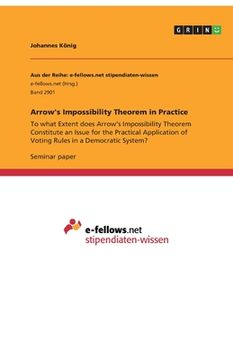Compartir
Arrow's Impossibility Theorem in Practice: To what Extent does Arrow's Impossibility Theorem Constitute an Issue for the Practical Application of Voti (en Inglés)
Johannes König
(Autor)
·
Grin Verlag
· Tapa Blanda
Arrow's Impossibility Theorem in Practice: To what Extent does Arrow's Impossibility Theorem Constitute an Issue for the Practical Application of Voti (en Inglés) - König, Johannes
$ 170.775
$ 284.624
Ahorras: $ 113.850
Elige la lista en la que quieres agregar tu producto o crea una nueva lista
✓ Producto agregado correctamente a la lista de deseos.
Ir a Mis Listas
Origen: Estados Unidos
(Costos de importación incluídos en el precio)
Se enviará desde nuestra bodega entre el
Lunes 01 de Julio y el
Lunes 15 de Julio.
Lo recibirás en cualquier lugar de Colombia entre 1 y 5 días hábiles luego del envío.
Reseña del libro "Arrow's Impossibility Theorem in Practice: To what Extent does Arrow's Impossibility Theorem Constitute an Issue for the Practical Application of Voti (en Inglés)"
Seminar paper from the year 2018 in the subject Politics - International Politics - General and Theories, grade: 1,7, University of Bayreuth, language: English, abstract: Accurately figuring out the cumulative ordering of preferences of an entire society as an aggregation of the orderings of preferences of many individuals would inherently simplify democratic decision processes. However, the social preference ordering is contingent on the specific procedure, or voting rule, used to aggregate the individual preference orderings. This means that different voting rules can lead to different social preference orderings under the input of the same individual preference orderings. This issue effectuates the questions which of the different possible outcomes is the most legitimate, and by extension which voting rule should be used. Arrow sought to answer these questions by demanding that voting rules satisfy a particular set of democratically desirable qualities - these are referred to as axioms or conditions. A voting rule that succeeds in complying with all the conditions could be considered democratically legitimate. The emerging issue is that no voting rule can possibly satisfy all theconditions simultaneously. The blatant preliminary conclusion of this impossibility theorem is somewhat bleak: our faith in democratic voting procedures might be entirely misguided. The aim of this paper is to ascertain, whether the implications of this impossibility theorem constitute an actual issue for the practical application of preference aggregation - or voting - in a democratic political system. Having argued that certain evasions of the impossibility can be practically justified in most cases, the paper will conclude that the impossibility is only relevant for a negligible number of scenarios. Thus, inferring that in most cases Arrow's impossibility theorem, albeit theoretically relevant, does not constitute a profound issue for voting procedures in a democratic political syste
- 0% (0)
- 0% (0)
- 0% (0)
- 0% (0)
- 0% (0)
Todos los libros de nuestro catálogo son Originales.
El libro está escrito en Inglés.
La encuadernación de esta edición es Tapa Blanda.
✓ Producto agregado correctamente al carro, Ir a Pagar.

